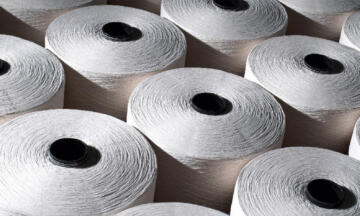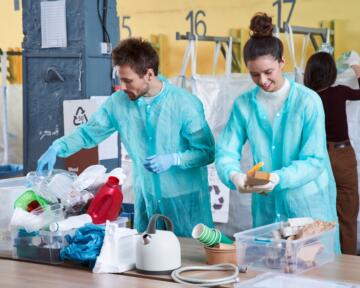Although the clothing industry has made major strides in terms of sustainability, the figures are still disconcerting. Every year, we throw away a staggering 7 million tonnes of clothes in Europe alone. Around half ends up in the second-hand circuit and the rest is either landfilled or incinerated. A meagre 1 % of our clothes is actually recycled.
High-quality recyclingAny recovery operation through which waste, including organic waste, is reprocessed to become substances, materials or products that can be used for their initial function or other functions. thanks to reverse spinning
So in theory there is a massive potential for the reuseReuse designates all operations by which substances, materials or products that are not waste are used again in an identical way to their originally intended purpose. of clothing fibres but the technical capabilities to achieve that were not yet fully developed. The classic recycling technique of shredding garments considerably shortens the fibres. As such they can only be used to produce fleece sweaters or jeans but not for more delicate applications such as a shirt. Belgian company Purfi is categorical that their patented technology makes this possible. By untwisting yarn - the opposite of spinning yarn - the fibres sustain hardly any damage and as a result they can once again be used for high-quality clothing.
Patented innovation
Purfi patented this new recycling method for a reason. Protecting their intellectual property provides businesses with legal protection for their inventions. This guarantee acts as an incentive to invest in research and development. Thanks to patents and licences, protected knowledge can be shared with other companies, fostering more widespread introduction of sustainable practices. In addition to a strong emphasis on recycling, Purfi also focuses on other aspects. Their entire installation is powered by solar energy, they don’t use any chemical agents and the whole process doesn’t produce any waste streams.
Europe tightens regulations for textile industry
Quality and sustainability are important but, of course, so is affordability. The clothing industry will only switch to recycled materials if the customer is willing to pay for them. Still, the added cost at the checkout appears to be reasonable. Purfi estimates that the price of a garment from recycled fibres is only 2 to 3 % higher than the traditional option. 2025 will be a watershed in this evolution with the EU’s introduction of a series of measures to reduce the footprint of the clothing industry. One of the measures will ban the destruction of unsold pieces - accounting for up to 30 % of production - and new clothing will have to include a certain percentage of recycled fibres.
Need for correct sorting
This means the future is looking bright for Purfi. However, in an interview with Belgian business and economics newspaper De Tijd, Managing Director Carl Baekelandt also sees challenges: “I don’t expect any issues with the collection of textile waste. Sorting the fabrics will be the real challenge. Textiles with 65 % cotton and 35 % polyester can’t be lumped together with fabrics consisting of 70 % cotton and 30 % polyester because at the end of the day you want pure end streams. The sorting technology is evolving but it’s not yet one hundred percent waterproof. The entire chain has to follow to be able to achieve recycling. And it remains to be seen how much capacity Europe will deploy to monitor compliance with the new rules. We must be careful not to be inundated with imported clothes that do not come up to the standard.”




